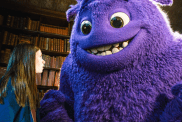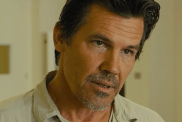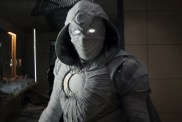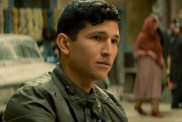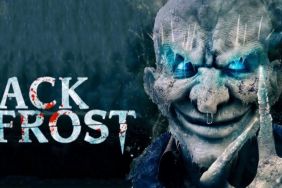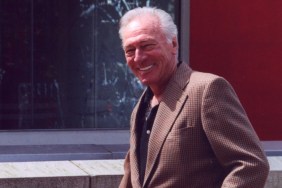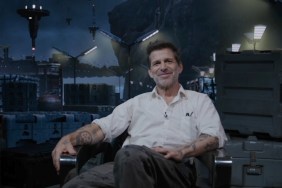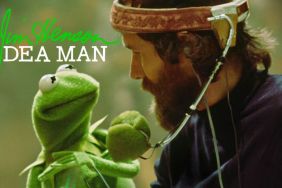Cast:
Frank Langella as Richard Nixon
Michael Sheen as David Frost
Sam Rockwell as James Reston, Jr.
Kevin Bacon as Jack Brennan
Oliver Platt as Bob Zelnick
Matthew Macfadyen as John Birt
Rebecca Hall as Caroline Cushing
Toby Jones as Swifty Lazar
Andy Milder as Frank Gannon
Kate Jennings Grant as Diane Sawyer
Gabriel Jarret as Ken Khachigian
Jim Meskimen as Raymond Price
Patty McCormack as Pat Nixon
Geoffrey Blake as Interview Director
Clint Howard as Lloyd Davis
Rance Howard as Ollie
Directed by Ron Howard
Summary:
With his usual filmmaking flair, Ron Howard has taken a great play and made it even better, perfectly preserving the performances by Frank Langella and Michael Sheen that made Peter Morgan’s work so special and embellishing them with an equally talented supporting cast.
Story:
In 1974, President Richard M. Nixon (Frank Langella) resigned from office under the scandal of Watergate and a few months later, television personality and producer David Frost (Michael Sheen) became interested in getting the interview of the century by questioning Nixon about his tenure as the country’s leader and give him the trial he never had to get him to come clean about his involvement in Watergate. The two men faced off in four sessions of interviews that put Frost’s mettle as a political interviewer to the test.
Analysis:
Those who didn’t get a chance to see this amazing play by Peter Morgan during its run in London and New York City should write a letter of thanks to director Ron Howard and his team of producers for having the foresight to capture the amazing performances by Michael Sheen and Frank Langella on film. Both were worth the accolades and awards they received from their stage performances, which have been lovingly transferred to the big screen in a way that avoids many of the pitfalls that often hinder movies based on plays.
Opening with the actual audio tapes that got Nixon into trouble and archival footage of the Senate hearings that followed, we first see Frank Langella as Richard Nixon as he’s giving the famous resignation speech that took the country and the world by storm. One outsider who became fascinated by the President’s decision was British talk show host David Frost (Michael Sheen) who was just as mystified by how Nixon escaped trial by being pardoned by his successor and decided that it would be the perfect interview opportunity. The first third of the film shows what was involved with convincing Nixon to be interviewed by Frost, financing the project himself after failing to find network backing, followed by the preparation involved. It’s not the most exciting part of the story, but when Frost and Nixon first meet face to face, things start to pick up and you know you’re in for something special.
Just like the play, the film is driven by Peter Morgan’s exemplary writing, filled with the same intelligence and clever and wry humor as his previous screenplays, with most of the words and structure taken almost verbatim from the play’s script. Like with “The Queen,” It’s some of the best dialogue you’ll see performed, and it quickly becomes apparent why no one but Sheen and Langella could play these roles.
One might automatically assume this is a movie about Richard Nixon’s resignation, though there’s a valid reason why Frost’s name comes first in the billing because the primary story is about David Frost’s journey from playboy talk show host to serious political interviewer. It isn’t a gradual transformation as much as one that happens quite suddenly during the interview process. As played by Sheen, Frost is an endlessly entertaining character on par with Steve Coogan’s Tony Wilson in “24 Hour Party People” and proving that sometimes the best interviewers are the unassuming ones who put their subjects at ease before going in for the attack.
Frank Langella certainly doesn’t look anything like Richard Nixon and he never deliberately tries to do an outright impression of the ex-President, as much as creating a fictionalized embodiment of the man. While the film does try to remain balanced, it acts almost as a psychoanalysis of the famed leader, allowing us to see aspects of his personality that have never been conveyed by his television appearances. Most of these involve extreme emotions, as we see him lose his temper a number of times as well as an almost childlike exuberance about possibly being challenged by Frost in their verbal feud.
When these two very different men sit down across from each other, that’s where the real fun begins and where the film starts to hit its stride, as Frost tries to strategize with a team of experts who have very little confidence that he’s the right man for the job. Even so, Nixon goes into the interviews feeling very confident that he can stay one step ahead of his opponent. While the film does try to remain balanced, Nixon is portrayed as a shrewd and formidable villain, his interaction with Frost almost reaching a Hannibal Lecter intensity at times. (There’s poetic irony that Anthony Hopkins played Nixon in Oliver Stone’s own biopic, which never got nearly as deep into the mindset of the ex-President as Langella does here.)
The historic interviews are framed and narrated by the supporting characters on both sides, and Howard’s film excels in the way these characters have been fleshed out with exceptional casting. This is most evident by Sam Rockwell as Jim Reston Jr., Frost’s liberal advisor whose absolute hatred of Nixon comes from writing four books about the mistakes made during his administration. Rockwell has generally been great in everything he’s done this year, but the fact he can stand head and shoulders with Sheen and Langella despite being new to the project is impressive. Similarly, Kevin Bacon turns Nixon’s Chief of Staff Jack Brennan into a sniveling Smithers-like toadie whose loyalty towards his boss borders on creepiness at times, but he also makes a great wingman, coming to his boss’ defense whenever he’s on the ropes.
The role of Caroline Cushing, the gorgeous and classy woman Frost encounters during a trans-Atlantic flight and ably played by Rebecca Hall, has also wisely been expanded to where she becomes his confidante and sounding board throughout the movie, while Oliver Platt offers fine comic relief as Reston’s equally frustrated comrade, Bob Zelnick. Toby Jones’ “Swifty” Lazarr borders on caricature with his exaggerated accent, while Matthew Macfadyen is not particularly interesting as Frost’s production partner John Birt, though both of them blend well into the ensemble.
Otherwise, Howard never allows the movie to become that much bigger than the stageplay, instead taking advantage of the outside world we would never be able to see on stage only when necessary. When Nixon’s cavalcade appears at the end of the street and drives towards the fateful meeting, it builds the kind of tension that can only be achieved on film. It leads to the final tense showdown where Frost finally grills Nixon on the topic of Watergate. By then, we’ve already seen the cracks forming in Nixon’s resolve during one of the film’s strongest scenes, a late night phone call between the two men, admittedly made-up for artistic license but effective nonetheless. Howard also quite brilliantly explores the film’s defining line about the effectiveness of the television close-up by putting the audience on stage with these two fantastic performers, making their final confrontation one for the ages. (Incidentally, the original interviews just became available on DVD; for the sake of comparison, one can easily see how Langella and Sheen have made this classic face-off even more dramatic.)
The Bottom Line:
Whether or not you’re interested in this particular piece of history and whether you’re able to accept Peter Morgan’s fictionalized account as fact should have little effect on one’s ability to be entertained by the results of this terrific play being turned into one of the best films of the year.

